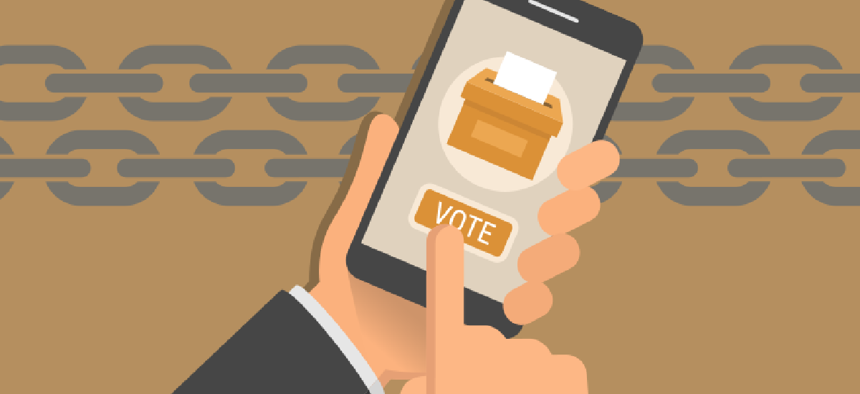West Virginia tries blockchain-based mobile voting

Military voters from two counties can cast absentee ballots with the secure mobile application.
West Virginia is the first state in the nation to use distributed ledger technology in a federal election to help secure the absentee ballots of military voters who are deployed overseas.
Service members from Harrison and Monongalia counties who qualify under the Uniformed and Overseas Citizens Absentee Voting Act will be able to cast their votes through a blockchain-based mobile app during the state’s primary elections starting March 23, 2018. The blockchain-secured ballots will be accepted until polls are closed on Primary Election Day on May 8, 2018.
UOCAVA voters will verify their identity through a mobile app that asks for a driver’s license, state ID or passport along with a current photo. Once the identity is confirmed, voters will get a mobile ballot based on the one that they would receive on election state at their local precinct.
The first active user of the mobile voting application was Scott Warner, son of Secretary of State Mac Warner. Scott Warner is registered to vote at his home in Monongalia County, but currently is deployed in Italy.
In a statement, Warner said the application was “very easy to maneuver” and had a reassuring ID verification process. “When the ballot was made available, I just clicked through the names of the candidates,” he said. “I hit ‘vote’ for the candidates I wanted to support. Then I used the thumb print Touch ID on my phone to verify who I was. That was it. Pretty slick!”
“We worked to do some due diligence to determine if blockchain is secure and whether a mobile app solution could increase military voter participation by making it a secure way to vote that is easier to verify,” Mike Queen, deputy chief staff and communications director for the West Virginia Secretary of State, told GCN. “Over the past four months, we worked to create partnership to do this on a small level where there may be 60 voters who qualify.”
Absentee ballot systems previously offered to overseas military voters do not ensure anonymity, and many military voters are concerned their mail-in or faxed ballots may not be received in time or may not be counted, according to the project's description.
To determine whether blockchain could help small state with a limited resources dedicated to elections securely and efficiently manage a cumbersome process, the state partnered with Voatz, a Boston-based startup.
“We are using a tamperproof ledger that ensures the anonymity of each ballot,” Voatz CEO Nimit Sawhney told GCN. “Blockchain provides an end-to-end verification trail where you have trust that all of the data in the system is accurate.”
West Virginia is using a public permissioned blockchain built on the Hyperledger platform.
To protect personally identifiable information, biometric data on each voter is deleted from the system once the identity has been verified. The only information kept on the blockchain is the anonymized votes that are transferred onto community records.
The company is training state election officials on how to use the platform while still complying with state election policies.
“We recognize that government agencies want to be able to roll out this kind of platform and still maintain control,” Sawhney said. “Working with validators based in West Virginia, we are able to provide assurances that the equipment being issued belongs to the state and malicious actors are not involved.”
The West Virginia Secretary of State’s office plans to release its findings from the pilot after the primary so other states and precincts can learn from the experience.





